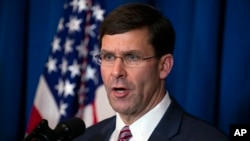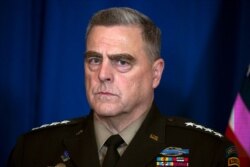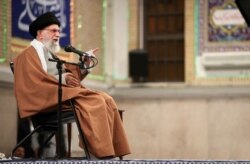The U.S. is prepared to take “preemptive” military action to prevent future attacks on U.S. forces, Defense Secretary Mark Esper said Thursday.
The Pentagon continues to see indications that Iran and Iranian-backed militias may be planning more strikes on U.S. forces in the Middle East, Esper warned.
“The game has changed, and we’re prepared to do what is necessary to defend our personnel and our interests and our partners in the region,” he said.
There were about a dozen attacks from Iranian-backed groups on bases in Iraq hosting U.S. and international forces in November and December, including one blamed on Kataeb Hezbollah in Kirkuk, killing an American contractor and wounding several U.S. and Iraqi troops.
“We know that there has been a sustained campaign, at least since October. We know that for certain, and we know that the campaign has increased in tempo and intensity,” Chairman of the Joint Chiefs of Staff Mark Milley told reporters earlier this week.
Recent U.S. airstrikes targeting Kataeb Hezbollah led to a two-day standoff at the U.S. Embassy in Baghdad. Militiamen and their supporters attacked the embassy compound Tuesday, wrecking a visitors center, setting several fires and writing graffiti to protest the airstrike.
Photos of the embassy compound showed Arabic graffiti saying, “No, No America” and “Soleimani is my leader,” referring to Gen. Qassem Soleimani, commander of Iran’s Quds Force, an elite wing of the Islamic Revolutionary Guard Corps (IRGC) that oversees foreign operations.
The situation was quieter Thursday, as Iranian-backed paramilitary groups left the area.
But late Thursday, at least three Katyusha rockets slammed into Baghdad International Airport.
Early Friday, Iraqi television and Iraq officials said Soleimani, the head of Iran’s elite Quds Force, was killed in the airstrike. Also killed was Abu Mahdi al-Muhandis, the deputy commander of Iran-backed militias known as the Popular Mobilization Forces (PMF), the officials said.
The PMF blamed the United States for the attack, but there was no immediate comment from the U.S. or Iran.
Earlier Thursday, U.S. Secretary of State Mike Pompeo accused Kataeb Hezbollah’s leader and others he called terrorists for orchestrating the Baghdad embassy assault.
Consular operations were suspended, and the State Department warned U.S. citizens to stay away from the site.
U.S. diplomats have been reported safe at the embassy, and Milley said he is “very confident” the embassy would not be physically overrun.
“There is sufficient combat power there — air and ground — that anyone who attempts to overrun that will run into a buzz saw,” Milley said.
The Pentagon has deployed an additional 750 soldiers to Kuwait in what Esper called “an appropriate and precautionary action.” About 100 Marines based in Kuwait were sent into Iraq Tuesday to aid in securing the embassy.
Esper called on Iraq to do more to address Iranian-sponsored militia groups and prevent attacks on U.S. and coalition forces.
“They need to investigate the attacks and help us bring to account the perpetrators. We haven’t seen sufficient action on that front,” Esper added.
In a speech on state television, Iranian Supreme Leader Ayatollah Ali Khamenei denounced the U.S. attacks.
“I and the government and the nation of Iran strongly condemn this American crime,” Khamenei said.
The Iranian leader claimed Tehran had nothing to do with the Baghdad protests, condemning U.S. President Donald Trump’s New Year’s Eve threat that Iran “will pay a very big price” if it damaged the U.S. Embassy or injured American personnel stationed there. “This is not a warning,” Trump said. “It is a threat.”
Khamenei responded to Trump, saying, “Be logical. ... The people of this region hate America. Why don’t Americans understand this? You Americans have committed crimes in Iraq, you have committed crimes in Afghanistan. You have killed people.”
Despite the conflict, Trump said this week he did not see the demonstrations escalating into a war.
Kenneth Schwartz contributed to this report.











